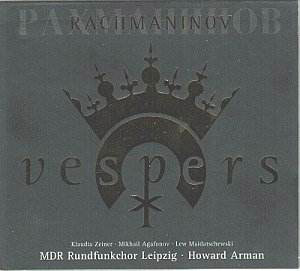Although generally known as the ‘Vespers’ in
English, Rachmaninov’s great contribution to the history of Russian
sacred music is, in fact, a setting of the services of Vespers, Matins,
and the First Hour as they are celebrated in the Russian Orthodox Church
and known as the ‘All-Night Vigil’. Rachmaninov might have been
somewhat ambivalent about the church, but he was far from irreligious
and, taking his cue from Tchaikovsky, had already composed a succession
of choral works when he began to write the ‘Vespers’ during a
concert tour of 1915. The first performance, in March of that year,
was given by the Moscow Synodal Choir under Nikolai Danilin, and proved
so successful with the public that it had to be repeated four times
during that season. The work is dedicated to the memory of the respected
theorist and scholar Stepan Vasilevich Smolensky, who had been responsible
for introducing Rachmaninov to the sacred repertoire at the Moscow Conservatory.
The ‘Vespers’ is a work which can inspire both
conductors and choirs to give of their very best, and subsequently has
done well on disc. I can say at the outset that this present recording
is as good as I’ve heard. Whilst it is a bit extreme to say success
depends on that amazing Slavic choral tradition characterised by the
sound of the basses, it is undeniably true that the ‘bottom end’ of
the choir is crucial; the ‘Nyne otpushchayeshi’ (Nunc Dimittis), descends
at the end to a low B flat, and low Cs are littered throughout the score.
In fact, Rachmaninov himself, (who had a special affection for this
fifth number), when questioned by colleagues as to where on earth they
were to find such capable singers, replied ‘I know the voices of my
countrymen, and well know the demands I can make of our Russian basses!’
The Leipzig Rundfunkchor is spectacular at this point, and need fear
nothing in comparison to the ‘authentic’ choirs on disc, probably best
epitomised by the St. Petersburg Cappella under Vladislav Chernushenko
on CDM. In fact, good as the sound of these Russian choirs is, their
intonation can be a little suspect in places, and in this regard the
Hyperion performance by the Corydon Singers under Matthew Best, must
be one of the securest on record.
Whatever the competition, this new Leipzig disc is
a real winner. The size of the choir gives it a weight and resonance
that is slightly lacking in the Corydon version, whilst their excellent
conductor, Howard Arman, makes sure that pitch and balance are as good
as one can hope for in such a virtuosic score. The depth of tone and
slavic-sounding darkness of the timbre is thrilling; try No. 10 (translated
as ‘The Veneration of the Cross’), where the composer’s chant-like texture
mimics the tolling of great bells, to see what I mean. The two soloists
are good, but the tenor rather spoils his contribution with pitch problems
in places, and the alto is a might operatic for this music (this is
a common complaint from critics in this piece). Both at least have an
authentic Russian tone quality, in itself worth having.
What does make the disc stand out from the competition
is the inclusion of the lector’s readings; these are chant-like interpolations
not dissimilar to our own Anglican services, but sounding wonderfully
deep and, well, Russian, in the formidable performance of Lew Maidatschewski.
His rich, dark bass voice is perfectly suited to this music, and although
I had not encountered a disc that uses the chants, they make the whole
thing that much more moving and convincing.
The recorded sound is just resonant enough for the
music to be placed in the correct ambience, but not too ‘cloudy’, as
some of the competition tends towards. The presentation is another intelligent
attempt to get away from the ubiquitous plastic jewel case, and notes
are brief but helpful. Texts and translations are included.
Very highly recommended.
Tony Haywood


